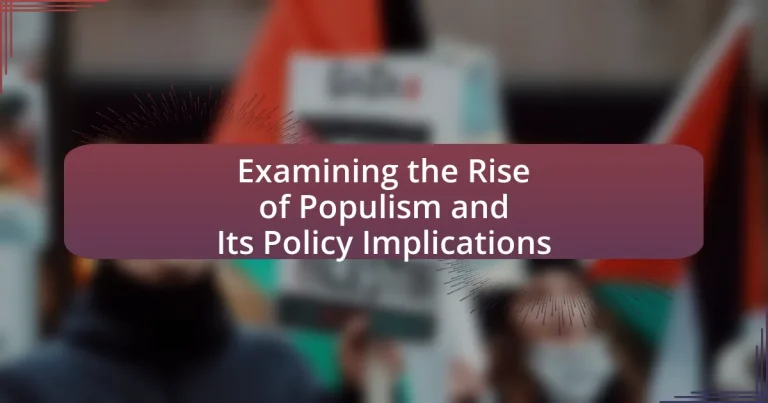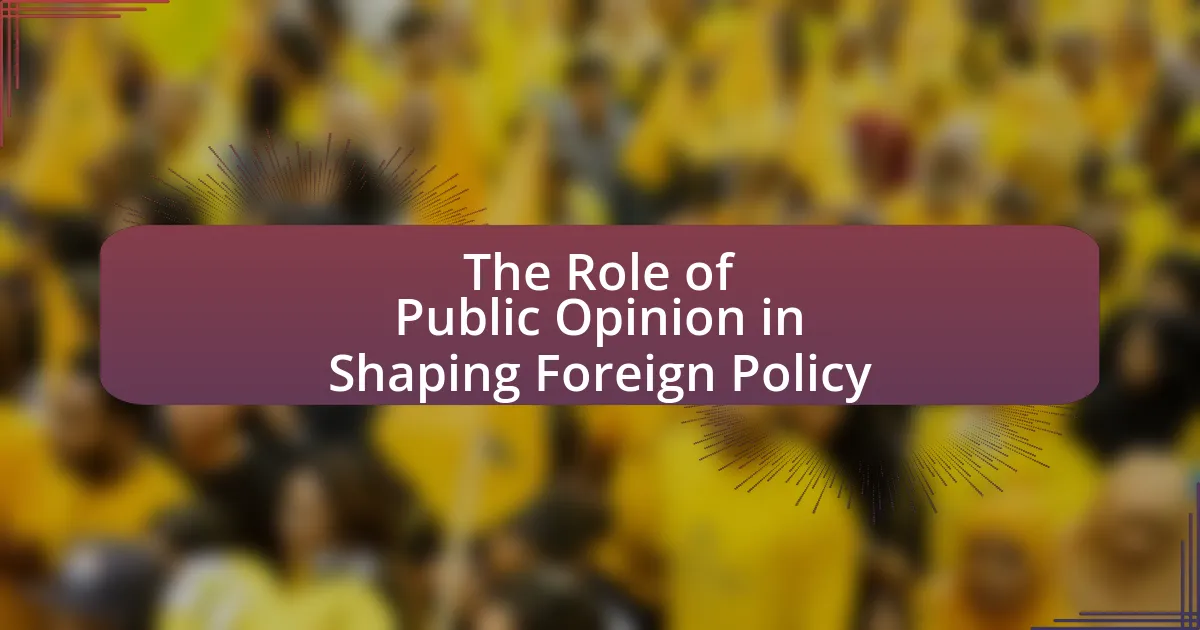Populism is a political approach that seeks to represent the interests of ordinary people against a perceived elite, gaining traction due to factors such as economic inequality, political disillusionment, and cultural backlash against globalization. The article examines the definition of populism, its key characteristics, and the factors contributing to its rise, including economic conditions and the role of social media. It also explores the implications of populism for democratic institutions, policy-making processes, and international relations, while highlighting the potential risks and long-term consequences of populist governance. Additionally, the article discusses strategies for countering populism and the lessons learned from past movements, emphasizing the importance of addressing underlying grievances to foster political stability.
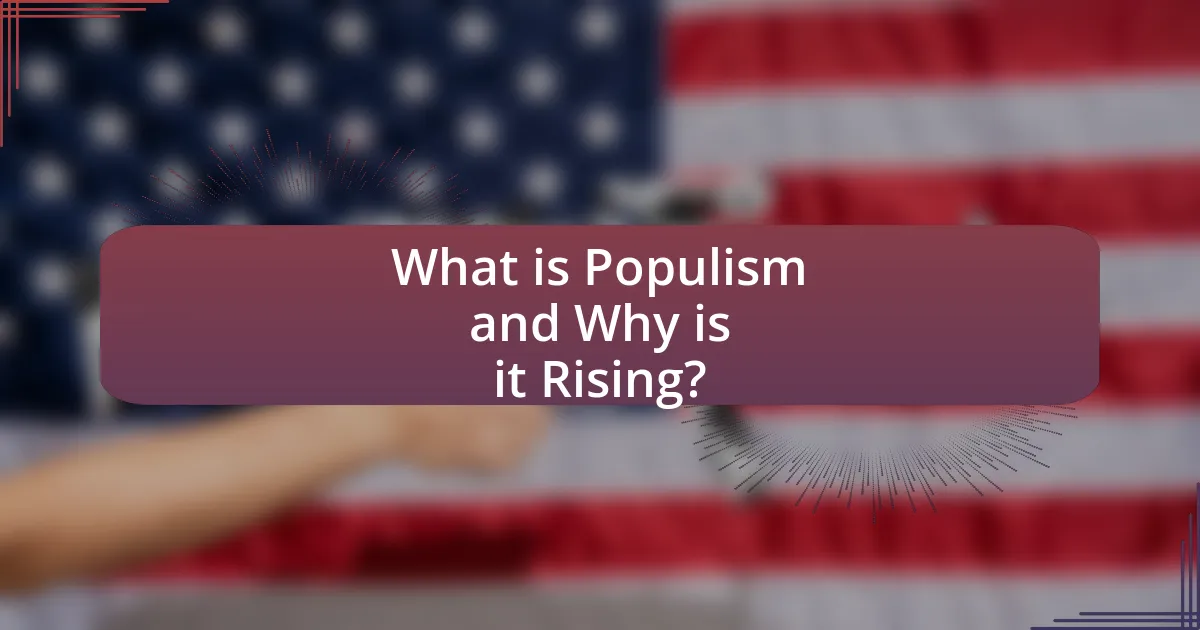
What is Populism and Why is it Rising?
Populism is a political approach that seeks to represent the interests of ordinary people, often contrasting them against a perceived elite or establishment. Its rise can be attributed to various factors, including economic inequality, political disillusionment, and cultural backlash against globalization. For instance, the 2008 financial crisis exacerbated economic disparities, leading to increased support for populist leaders who promise to challenge the status quo. Additionally, surveys indicate that many voters feel disconnected from traditional political parties, driving them toward populist movements that claim to give voice to the “common people.”
How do we define populism in a political context?
Populism in a political context is defined as a political approach that seeks to represent the interests and concerns of ordinary people, often contrasting them against a perceived elite or establishment. This definition is supported by the observation that populist movements typically emerge during periods of social or economic discontent, where leaders claim to voice the will of the “common people” against the “corrupt elite.” Historical examples include the rise of leaders like Hugo Chávez in Venezuela and Donald Trump in the United States, both of whom utilized populist rhetoric to galvanize support by emphasizing a divide between the populace and the political establishment.
What are the key characteristics of populist movements?
Populist movements are characterized by their appeal to the common people against the elite, emphasizing a dichotomy between “the people” and “the elite.” These movements often utilize charismatic leadership, which fosters a strong emotional connection with supporters. Additionally, populist movements typically advocate for direct democracy and claim to represent the will of the majority, often through referendums or mass mobilization. They also tend to simplify complex political issues into clear, binary choices, making their messages more accessible. Historical examples include the rise of leaders like Hugo Chávez in Venezuela and Donald Trump in the United States, both of whom capitalized on public discontent with established political systems and elites.
How does populism differ from traditional political ideologies?
Populism differs from traditional political ideologies by prioritizing the interests and concerns of the “common people” over established elites and institutions. Traditional political ideologies, such as liberalism or conservatism, often focus on structured frameworks of governance, economic theories, and social hierarchies, whereas populism emphasizes a direct appeal to the masses, often bypassing conventional political processes. For instance, populist movements frequently utilize rhetoric that frames political discourse as a struggle between the elite and the ordinary citizen, as seen in the rise of leaders like Donald Trump in the United States and Jair Bolsonaro in Brazil, who both capitalized on widespread discontent with traditional political establishments. This distinction highlights populism’s unique approach to mobilizing support and shaping policy, often leading to significant shifts in political landscapes.
What factors contribute to the rise of populism?
Economic inequality, political disillusionment, and cultural backlash contribute significantly to the rise of populism. Economic inequality creates a divide where a segment of the population feels marginalized and left behind, leading to a demand for populist leaders who promise to address these grievances. Political disillusionment arises from a lack of trust in traditional political institutions and elites, prompting voters to seek alternatives that claim to represent the “common people.” Cultural backlash often stems from rapid social changes, such as immigration and globalization, which can provoke a sense of loss among certain demographics, driving them towards populist movements that advocate for nationalism and traditional values. These factors have been observed in various countries, such as the United States and several European nations, where populist parties have gained traction in response to these underlying issues.
How do economic conditions influence populist sentiments?
Economic conditions significantly influence populist sentiments by shaping public perceptions of economic insecurity and dissatisfaction with traditional political elites. When economic downturns occur, such as high unemployment rates or stagnant wages, individuals often feel marginalized and disillusioned, leading them to seek alternative political solutions. For instance, during the 2008 financial crisis, many voters turned to populist leaders who promised to address their grievances against the establishment, as evidenced by the rise of figures like Donald Trump in the United States and various populist movements in Europe. Research indicates that economic distress correlates with increased support for populist parties, as these parties often capitalize on feelings of disenfranchisement and advocate for policies that resonate with economically vulnerable populations.
What role does social media play in the spread of populism?
Social media significantly facilitates the spread of populism by providing a platform for direct communication between populist leaders and their supporters. This direct engagement allows populist figures to bypass traditional media, disseminate their messages rapidly, and mobilize grassroots support. For instance, during the 2016 U.S. presidential election, Donald Trump utilized Twitter to communicate his views and rally his base, demonstrating how social media can amplify populist rhetoric and foster a sense of community among followers. Research indicates that social media platforms can create echo chambers, reinforcing populist narratives and isolating users from opposing viewpoints, which further entrenches populist ideologies.
Why is understanding populism important for contemporary politics?
Understanding populism is crucial for contemporary politics because it shapes voter behavior and influences policy decisions. Populism often arises in response to perceived disconnects between political elites and the general populace, leading to significant shifts in political landscapes. For instance, the rise of populist leaders in various countries, such as Donald Trump in the United States and Jair Bolsonaro in Brazil, illustrates how populist rhetoric can mobilize support by appealing to national identity and economic grievances. This phenomenon has been documented in studies, such as the research by Cas Mudde and Cristóbal Rovira Kaltwasser, which highlights the impact of populism on democratic institutions and governance. Understanding these dynamics allows political analysts and policymakers to navigate the challenges posed by populist movements and to address the underlying issues that fuel them.
How does populism affect democratic institutions?
Populism undermines democratic institutions by eroding checks and balances, fostering polarization, and promoting authoritarian tendencies. Populist leaders often challenge the legitimacy of established institutions, portraying them as corrupt or out of touch with the “will of the people.” This can lead to the weakening of judicial independence, as seen in countries like Hungary, where the government has exerted control over the judiciary, diminishing its role as a check on executive power. Additionally, populism can exacerbate societal divisions, making consensus-building more difficult and destabilizing democratic governance. Research indicates that populist movements often prioritize short-term electoral gains over long-term institutional integrity, which can result in the deterioration of democratic norms and practices.
What implications does populism have for political discourse?
Populism significantly alters political discourse by prioritizing the voice of the “common people” over established elites, often leading to a polarized environment. This shift can result in the simplification of complex issues into binary choices, fostering an “us versus them” mentality. For instance, populist leaders frequently employ rhetoric that vilifies political opponents and institutions, which can undermine trust in traditional democratic processes. Research indicates that populism can diminish the quality of public debate, as seen in various countries where populist movements have gained traction, such as the United States and Brazil, where political polarization has intensified.
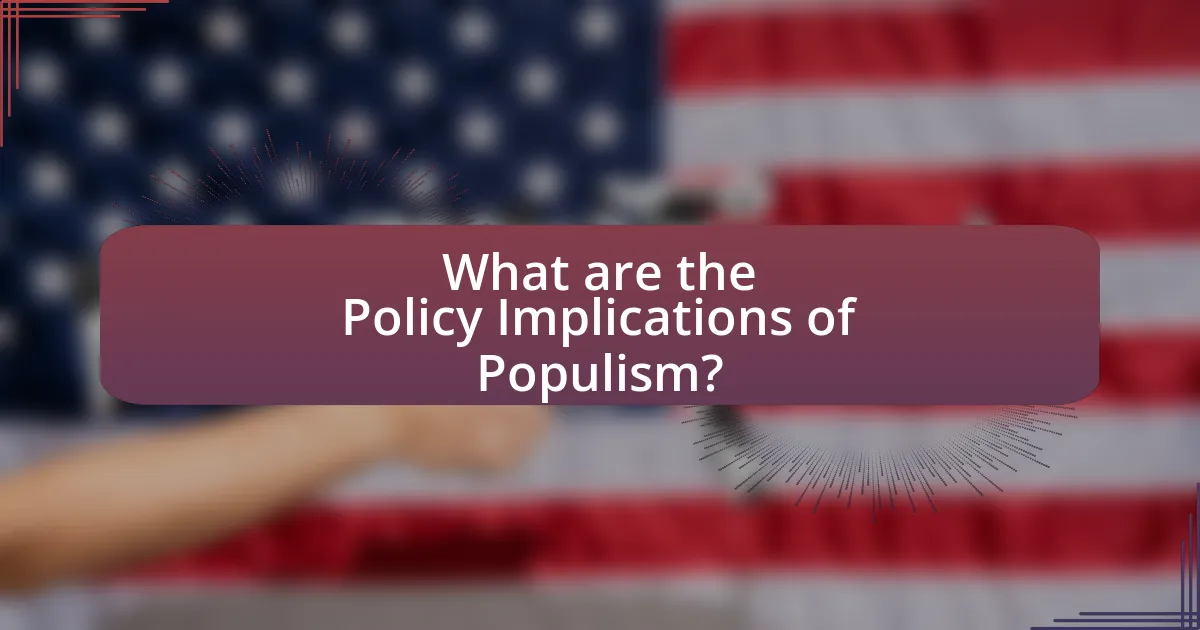
What are the Policy Implications of Populism?
The policy implications of populism include a shift towards protectionism, increased government intervention in the economy, and a challenge to established political norms. Populist movements often advocate for policies that prioritize national interests over global cooperation, leading to trade barriers and restrictions on immigration. For example, the rise of populist leaders in various countries has resulted in the implementation of tariffs and trade agreements that favor domestic industries. Additionally, populism can lead to the erosion of democratic institutions as populist leaders may concentrate power and undermine checks and balances, as seen in Hungary under Viktor Orbán. These implications reflect a broader trend where populist rhetoric translates into tangible policy changes that can reshape economic and political landscapes.
How does populism influence policy-making processes?
Populism influences policy-making processes by prioritizing the demands of the general populace over established political norms and expert opinions. This shift often leads to the implementation of policies that resonate with popular sentiment, such as anti-immigration measures or economic protectionism, as seen in the rise of populist leaders like Donald Trump in the United States, who emphasized “America First” policies. Additionally, populist movements tend to bypass traditional legislative procedures, favoring direct appeals to the public through referendums or social media, which can result in rapid policy changes that reflect the immediate desires of the electorate rather than long-term strategic planning. This approach can undermine institutional checks and balances, as evidenced by the erosion of democratic norms in various countries where populist leaders have gained power.
What types of policies are typically associated with populist leaders?
Populist leaders are typically associated with nationalist, anti-establishment, and protectionist policies. Nationalist policies often emphasize sovereignty and prioritize the interests of the native population over foreign influences, as seen in leaders like Donald Trump, who advocated for “America First” policies. Anti-establishment policies challenge traditional political elites and institutions, promoting a direct connection with the populace, exemplified by figures such as Bernie Sanders, who criticized corporate influence in politics. Protectionist policies focus on safeguarding domestic industries from foreign competition, which is evident in tariffs imposed by populist leaders to protect local jobs and businesses. These policy types reflect a broader trend of appealing to the sentiments and grievances of the general populace, often in response to perceived threats from globalization and immigration.
How do populist policies impact economic stability?
Populist policies can destabilize economic stability by prioritizing short-term gains over long-term sustainability. These policies often involve increased government spending, protectionist trade measures, and the implementation of subsidies, which can lead to budget deficits and inflation. For instance, during the presidency of Hugo Chávez in Venezuela, populist policies resulted in significant economic mismanagement, leading to hyperinflation and a collapse of the economy. Additionally, populist rhetoric can create uncertainty in markets, as seen in the aftermath of Brexit, where populist sentiments contributed to volatility in the British pound and stock markets. Such examples illustrate that while populist policies may provide immediate relief or support to certain demographics, they frequently undermine overall economic stability in the long run.
What are the potential risks of populist policies?
Populist policies pose several potential risks, including economic instability, erosion of democratic institutions, and increased social division. Economic instability can arise from populist leaders prioritizing short-term gains over sustainable growth, leading to fiscal irresponsibility, as seen in Venezuela under Hugo Chávez, where expansive social programs contributed to hyperinflation. The erosion of democratic institutions occurs when populist leaders undermine checks and balances, often consolidating power and diminishing the role of opposition, exemplified by Hungary’s Viktor Orbán, who has curtailed media freedom and judicial independence. Additionally, populist rhetoric can exacerbate social divisions by fostering an “us versus them” mentality, which can lead to increased polarization and conflict within society, as evidenced by the rise of nationalist sentiments in various countries.
How can populist policies lead to social division?
Populist policies can lead to social division by fostering an “us versus them” mentality that alienates certain groups within society. This division often arises when populist leaders emphasize the interests of a specific demographic, typically the “common people,” while portraying elites or minority groups as adversaries. For instance, research by Cas Mudde and Cristóbal Rovira Kaltwasser in “Populism: A Very Short Introduction” highlights how populism can exacerbate societal cleavages by simplifying complex issues into binary choices, which can marginalize those who do not fit the populist narrative. Consequently, this polarization can result in increased social tensions, conflict, and a breakdown of social cohesion.
What are the long-term consequences of populist governance?
Long-term consequences of populist governance include increased polarization, erosion of democratic institutions, and economic instability. Populist leaders often prioritize short-term gains and appeal to emotions, which can lead to divisive politics and a fragmented society. For instance, research by the Varieties of Democracy project indicates that countries experiencing populist governance often see a decline in political trust and civic engagement, undermining democratic norms. Additionally, populist policies may result in unsustainable economic practices, as seen in Venezuela under Hugo Chávez, where reliance on oil revenues without diversification led to severe economic crises. These patterns demonstrate that while populist governance may yield immediate support, the long-term effects can be detrimental to both democracy and economic stability.
How do different countries respond to the rise of populism?
Different countries respond to the rise of populism through a variety of political, social, and economic strategies. For instance, in the United States, the rise of populism has led to a shift in the Republican Party towards more nationalist and anti-establishment positions, exemplified by the election of Donald Trump in 2016, who capitalized on populist sentiments. In contrast, European nations like Italy and Hungary have seen populist parties gain power, prompting traditional parties to either adapt their platforms or form coalitions with these populist movements, as seen with Italy’s League party and Hungary’s Fidesz party. Additionally, countries such as France have experienced significant electoral challenges from populist candidates, leading mainstream parties to adopt more populist rhetoric to retain voter support. These responses illustrate how the rise of populism influences political dynamics and policy-making across different nations.
What strategies have been effective in countering populist movements?
Effective strategies for countering populist movements include promoting inclusive political discourse, strengthening democratic institutions, and addressing economic inequalities. Inclusive political discourse fosters dialogue that counters divisive rhetoric, while strong democratic institutions ensure accountability and transparency, which can diminish populist appeal. Addressing economic inequalities through targeted social policies can alleviate the grievances that populist movements often exploit. For instance, countries like Denmark and Sweden have successfully implemented social welfare programs that reduce inequality and enhance social cohesion, thereby mitigating the rise of populism.
How do international relations change in a populist context?
International relations change in a populist context by prioritizing national interests over global cooperation. Populist leaders often adopt unilateral policies, leading to a decline in multilateral agreements and international alliances. For example, the United States under President Donald Trump withdrew from the Paris Agreement and the Trans-Pacific Partnership, signaling a shift towards isolationism. This shift can result in increased tensions between nations, as populist rhetoric often frames foreign entities as threats to national sovereignty, thereby complicating diplomatic relations.
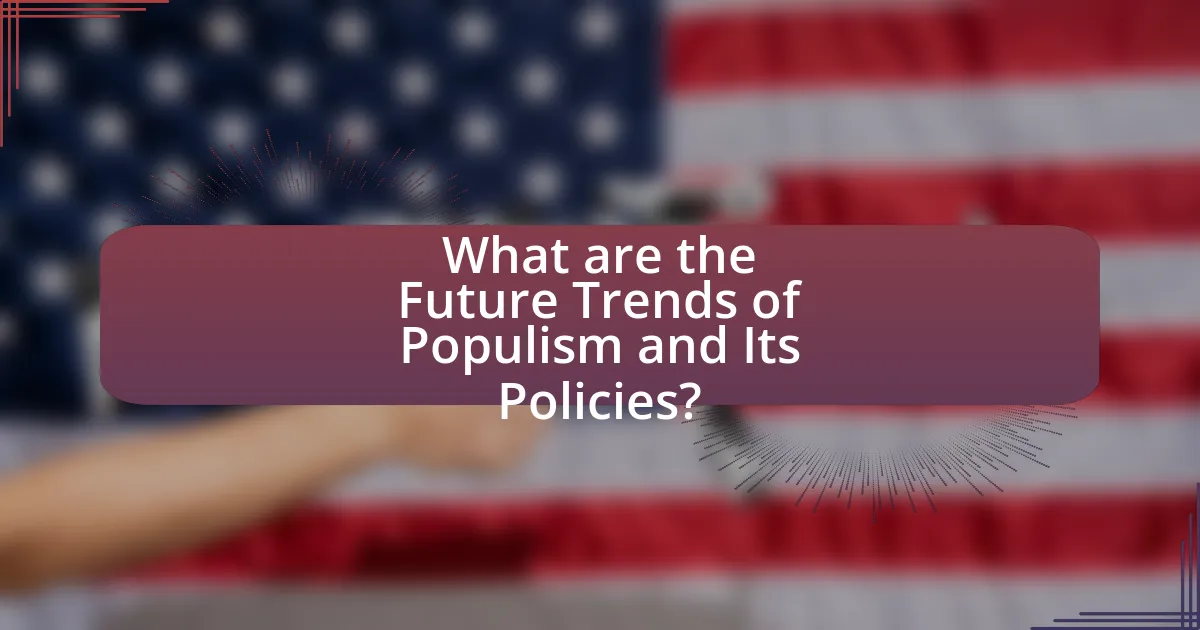
What are the Future Trends of Populism and Its Policies?
Future trends of populism and its policies indicate a rise in nationalist sentiments, increased polarization, and a focus on anti-establishment rhetoric. Research shows that populist movements are likely to continue leveraging social media to mobilize support and disseminate their messages, as evidenced by the success of populist leaders in various countries who have utilized these platforms effectively. Additionally, economic inequality and dissatisfaction with traditional political parties are expected to fuel populist agendas, leading to policies that prioritize protectionism and anti-globalization measures. For instance, the economic disruptions caused by the COVID-19 pandemic have intensified calls for localism and self-sufficiency, aligning with populist ideologies.
How might populism evolve in the coming years?
Populism is likely to evolve by becoming more digitally driven and increasingly focused on identity politics. As technology advances, populist movements will leverage social media platforms to mobilize support and disseminate their messages more effectively, as seen in recent elections where online campaigns significantly influenced voter behavior. Furthermore, the rise of social and economic inequalities may lead populist leaders to adopt more radical stances, appealing to specific demographic groups by emphasizing nationalism and anti-establishment sentiments. This trend is supported by the increasing polarization observed in various countries, where populist parties have gained traction by addressing the grievances of marginalized communities.
What emerging issues could fuel the next wave of populism?
Emerging issues that could fuel the next wave of populism include economic inequality, climate change, and immigration. Economic inequality has been rising, with the wealth gap widening significantly; for instance, the top 1% of earners in many countries have seen their share of income increase dramatically over the past few decades, leading to widespread discontent among the working and middle classes. Climate change is causing increasing anxiety and displacement, as extreme weather events and resource scarcity create a sense of urgency and vulnerability, prompting populist leaders to exploit fears and propose radical solutions. Immigration remains a contentious issue, with rising numbers of migrants leading to cultural tensions and fears of job loss, which populist movements often capitalize on by promoting nationalist rhetoric. These factors collectively create fertile ground for populist sentiments to grow, as they resonate with the frustrations and fears of the electorate.
How will technological advancements shape populist movements?
Technological advancements will significantly shape populist movements by enhancing communication and mobilization capabilities. The rise of social media platforms allows populist leaders to directly engage with supporters, bypassing traditional media filters, which has been evidenced by the success of figures like Donald Trump and Jair Bolsonaro in utilizing platforms like Twitter and Facebook to rally their bases. Additionally, data analytics enables targeted messaging, allowing populist movements to tailor their appeals to specific demographics, as seen in the Cambridge Analytica scandal, where data was used to influence voter behavior in elections. These advancements create an environment where populist narratives can spread rapidly, fostering a sense of community among supporters and amplifying their political influence.
What lessons can be learned from past populist movements?
Past populist movements demonstrate that economic discontent often fuels their rise, as seen in the Great Depression’s impact on the popularity of populist leaders like Huey Long in the United States. These movements frequently exploit societal divisions, leveraging grievances to mobilize support, which was evident in the Brexit campaign that capitalized on national identity and economic anxiety. Furthermore, the tendency for populist leaders to undermine democratic institutions highlights the importance of safeguarding checks and balances, as observed in Hungary under Viktor Orbán, where democratic norms have been eroded. Lastly, the transient nature of populist support suggests that addressing the underlying issues of discontent is crucial for long-term political stability, as seen in the decline of populist parties in various European countries when economic conditions improved.
How can policymakers prepare for the challenges posed by populism?
Policymakers can prepare for the challenges posed by populism by fostering inclusive dialogue and addressing the root causes of public discontent. This involves actively engaging with communities to understand their grievances, which often stem from economic inequality, cultural alienation, and political disenfranchisement. For instance, research by the Pew Research Center indicates that economic anxiety and a perceived lack of representation significantly contribute to the rise of populist sentiments. By implementing policies that promote economic equity, enhance civic engagement, and improve transparency in governance, policymakers can mitigate the appeal of populism and build trust with the electorate.
What best practices can be adopted to mitigate populist risks?
To mitigate populist risks, governments and institutions should prioritize transparency, engage in inclusive dialogue, and promote education. Transparency in governance fosters trust and reduces the appeal of populist narratives that thrive on misinformation. Engaging in inclusive dialogue allows diverse voices to be heard, countering the divisive rhetoric often used by populists. Promoting education, particularly critical thinking and media literacy, equips citizens to discern fact from fiction, thereby diminishing the influence of populist rhetoric. These practices are supported by studies indicating that informed and engaged citizens are less susceptible to populist manipulation.
What practical steps can citizens take to engage with populism constructively?
Citizens can engage with populism constructively by actively participating in local governance and community discussions. This involvement allows citizens to voice their concerns and contribute to policy-making processes that reflect the needs of their communities. For instance, attending town hall meetings or joining local advocacy groups can foster dialogue between citizens and elected officials, ensuring that diverse perspectives are considered in decision-making. Research indicates that civic engagement enhances democratic processes and can mitigate the divisive effects of populism by promoting understanding and collaboration among different societal groups.
